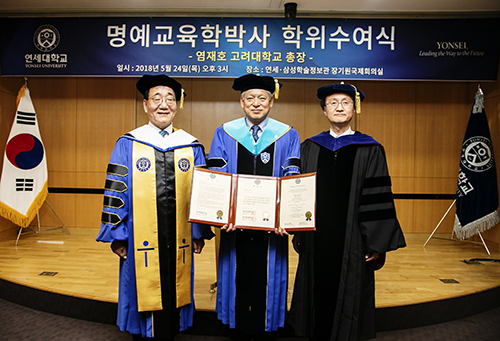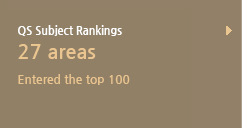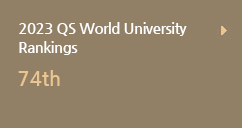Jaeho Yeom, president of Korea University, is granted an honorary doctorate in education from Yonsei University.
- In recognition of his contributions to the mutual development of Korea and Yonsei Universities, to innovation in higher education, and to the paradigm shift in higher education at the turning point of civilization in the 21st century

▲ From left to right: Yonghak Kim, President of Yonsei University; Jaeho Yeom, President of Korea University; and Seunghan Park, Dean of Graduate School of Yonsei University.
Jaeho Yeom, President of Korea University, was granted an Honorary Doctorate in Education from Yonsei University at the commencement ceremony on Thursday, May 24th at 3:00 pm, which was held at the ChangKiWon International Conference Hall, Samsung Academic Information Center, Yonsei University.
The Honorary Doctorate is in recognition of his efforts to not only the mutual development of Korea and Yonsei Universities, but also innovation in higher education. As a political scientist and a political administration scholar, President Yeom has contributed to the application of theories and knowledge of public administration in the real world through his active participation in and consultation to academic societies and research institutions. He has accomplished great achievements in various sectors, from policies and institutions, to public administration theories, to science and technology policies.
At this turning point of civilization in the 21st century, he has influenced the activities of universities and the government to explore and cultivate new science and technology policies as well as convergence technology. As an educational administrator, he has contributed to the paradigm shift in higher education by developing a centennial plan for the Korean educational system.
Back in 2013, Yeom was awarded the Red Stripes Order of Service Merit from the President of South Korea at the Hanmaum Meeting for Scientists hosted by the Ministry of Science, ICT and Future Planning. Since he was elected as the President of Korea University in 2015, he has made continuous efforts to establish KU as a globally renowned private university. Last year, he launched a joint lecture series between Yonsei University and Korea University, helping strengthen the competitiveness of the two universities through academic exchange and nurture future leaders of Korea society.
Over the past three years, President Yeom has presented new values for universities in order to meet the demands of the fast-changing society.
After reflecting on what roles Korea University should play in guiding, leading, and creating the future, he announced that Korea University would look for students with pioneer’s mind and empathy, rather than those who are only interested in getting good grades by any means. He reorganized the Office of Administration to establish an admission system that ensures the selection of high-potential applicants through in-depth interviews, and launched program scholarships and living allowance scholarships instead of merit scholarships. In addition, he introduced the Three-No’s Policy of no grading on a curve, no exam supervisors, and no attendance check, so that both KU students and faculty could become more proactive in education and develop more sense of responsibility and autonomy.
President Yeom believes that the flipped classroom model, where lectures happen online outside of class and students have discussions in the classroom setting, is a more effective educational strategy than one-way lecturing. He has also introduced a new compulsory subject titled “Liberty, Justice, and Truth” in order to help KU students internalize knowledge they acquired at the university through problem solving and design thinking. All freshmen from 2018 onwards are required to complete the subject for two semesters.
Korea University also opened the KU π-Ville, a first space of its kind in Korea where students from different majors can collaboratively create new ideas and start businesses. Korea University’s CJ Creator Library (CCL) is a next-generation library, where students not only consume knowledge as they do in traditional libraries, but also generate new knowledge by using media and social networks. As such, Korea University is making continuous efforts to transform its campus from a space of knowledge transfer into a flexible playground of knowledge and a “melting pot” of knowledge. Korea University hopes that its future-oriented educational platform can attract more global talents and facilitate the generation of ideas.
Korea University, which ranked 90th among global higher education institutions, is also expanding its global network. In 2016, it established the East Asia-Nordic/Benelux University Consortium (ENUC) in cooperation with renowned universities in East Asia and Northern Europe. This year, it became a member of Venice International University (VIU), a first for a university in Korea. In 2017, a total of 18,147 international students from 115 countries around the world attended Korea University. Currently, 1,124 KU students are participating in exchange student programs and various global leadership programs in China, Japan, and South American countries, taking university courses and intensive language and cultural studies courses in each country.
In terms of quality of education, Korea University was ranked 98th in 2016 and 90th in 2017 among universities around the world in an internationally recognized university ranking. It was also ranked No. 1 among Korean comprehensive private universities for the third year in a row. Notably, it was included in the top 50 universities for engineering and technology— showing that Korea University’s decade-long efforts to develop its science and engineering departments finally paid off. Meanwhile, Korea University Anam Hospital was selected to participate in a national strategic project worth KRW 76.9 billion, and achieved remarkable growth in multiple areas, including research paper publication, R&D, intellectual property right, technology transfer, and clinical trials, and is being poised to lead the biomedical research, which is a key growth engine for the future.
In addition to quantitative growth, Korea University is at the vanguard of innovation that will change the future of higher education. Over the last three years, Korea University has proposed its future vision of college entrance examination, education, research, and university administration under the banner of “KU-The Future.” Such a paradigm shift in higher education was a wake-up call for the Korean society. Many people came forward to support Korea University’s bold initiatives and gave generous donation worth a whopping KRW 110 billion to the university last year alone.
At the commencement ceremony, President Kim of Yonsei University said: “The MOU signed today is part of our ongoing academic exchange efforts, such as joint lecture series. I’ve known President Yeom for over 40 years, as a fellow scholar and as a good friend. He has the best leadership qualities. He puts public interest before private. He knows how to put things in perspective. His philosophy of higher education is based on his reasonable and warm-hearted attitude—an attitude that is exemplary to many. I hope he continue to lead the innovation of higher education in Korea.”
In his speech, President Yeom said: “Our two universities will continue to play a central role in shaping the future of higher education in Korea. The existing college entrance process must change in ways that allow applicants with different views and outside-the-box thinking to have opportunities to receive quality higher education. Universities should not only help their students get more A’s and get best jobs, but also cultivate future leaders of society. The world around us in the 21st century is changing at break-neck speed. Last year, Korea University and Yonsei University launched a joint lecture series, and today, we signed an MOU to build an open network. We’re committed to supporting more active and more comprehensive efforts to drive open innovation. Our ultimate goal is to nurture talents who contribute to the creation of knowledge that will transform the future and the global society.”



